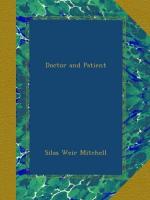Families see this peril, and can be often made to understand the unwisdom of this sacrifice; but, in cases of prolonged disease, such as hysteria in a bedridden sister or mother, it is hard to make them hear reason, and still more hard to make the nursing relation understand that she is of necessity the worst of nurses, and may share the wreck she helps to make.
These old and happily rare cases of chronic nervous invalids are simply fatal to loving nurses. I have said, perhaps too often, that invalidism is for most of us a moral poison. Given a nervous, hysterical, feeble woman, shut out from the world, and if she does not in time become irritable, exacting, hungry for sympathy and petty power, she is one of nature’s noblest. A mother or sister gives herself up to caring for her. She is in the grip of an octopus. Every fine quality of her nature helps to hurt her, and at last she breaks down utterly and can do no more. She, too, is become nervous, unhappy, and feeble. Then every one wonders that nobody had the sense to see what was going on. I can count many examples of nervousness which have arisen in this fashion. Perhaps my warning may not be without good results. Over and over I have made like statements in one or another form, and the increasing experience of added years only contributes force to my belief that, in still urging the matter, I am doing a serious duty. I ought to say also that the care of these invalids is, even to the well-trained and thoughtful nurse, one of the most severe of moral and physical trials, and that, in the effort to satisfy the cravings of these sick people, I have seen the best nurses crumble as it were in health, and at last give up, worn out and disheartened. A part of the responsibility of such disasters falls on the physician who forgets that it should be a portion of his duty to look sharply after the health of too devoted nurses as well as that of selfish patients.
I have now said all that I need to say of the causes which, directly or indirectly, evoke the condition we call nervousness. Many of these are insidious in their growth. Too often the husband, if she be married, is immersed in his own cares, and fails to see what is going on. “I am not ill enough to see a doctor,” she says, and waits until she has needlessly increased the difficulties of his task. Let us suppose, however, that, soon or late, she is doing, in a merely medical way, all that he insists upon, what more can she do for herself? She has before her very likely a long trial, severe in its exactions in proportion to her previous activity of mind and body. She most probably needs rest, and now that physicians have learned its value, and that not all ills are curable by exertion, she is told to lie down some hours each day. If she cannot get rid of her home duties, let her try at least to secure to herself despotically her times of real and true rest. To lie down is not enough. What she needs is undisturbed repose, and not to have




